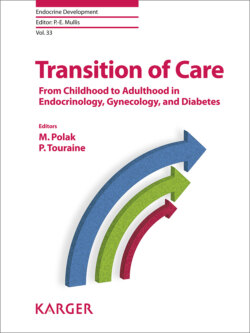Читать книгу Transition of Care - Группа авторов - Страница 15
На сайте Литреса книга снята с продажи.
Challenges Linked to the Disease Itself
ОглавлениеThe challenge may also come from the nature of the disease itself. In endocrinology, rare disorders are often taken care of. Therefore the numbers of endocrinologists for adults who are able to master the care of such disorders may be low. This is even more difficult for metabolic disorders, which are even rarer; there is still a need to have specific adult medicine subspecialties with staff trained to take care of young adults (e.g., nephrologists or hepatologists for metabolic disorders). This is certainly an area where a structuration of the rare disorder plan to be able to have a reference center, at the national and international levels, improves the situation. The examples of rare disorder plans such as those in Holland, France, and other countries (see the website FIRENDO for the rare disorder plan for endocrine disorders in France: http://www.firendo.fr/accueil-filiere-firendo/) and now the ENDO-ERN (European Reference Network for Rare Endocrine Disorders: http://endo-ern.eu/) recently endorsed by the European Community have paved the way for care improvement and notably transfer, as organizing transition of care is one objective of those health plans.
For other disorders, such as diabetes mellitus, there may be or may have been different concepts of care between pediatricians (e.g., sometimes keeping the adolescent patients on 2 injections a day) and diabetologists for adults (often eager to put the adolescents on a basal/bolus scheme or on insulin pump therapy). This can be solved by an upfront discussion between the 2 teams as, as a rule, no therapeutic changes should be made just at the time of transfer.
